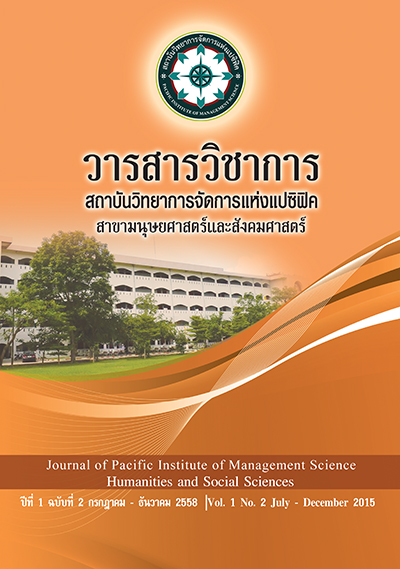Legal Problems and Legal Obstacles in Elimination of Waste For Sustainable Preservation of Environment
Keywords:
Solid waste disposal, treatment, quality, environment, sustainabilityAbstract
This thesis has the aim to study the legal problem and legal obstacle in elimination of waste for sustainable preservation of environment. The scope of the study ranges from conception, theories and relevant researches concerned with eradication of the waste in Thailand to those abroad. To put it more precisely, in order to comprehend the problems, the study concentrates on methodology of elimination of waste deployed under by-laws enforced by local administration organizations. The problems that this thesis is keen on to apprehend are both factual and legal. From the problems arise the information of how waste can be eradicated – incineration, sanitary landfill closure, recycling, organic fertilizer making, transferring waste into energy and other measures conducted from provincial to country organs. With the aforementioned information, the thesis specifies the problem and purports the measures to eradicate waste. The research methodology is in-depth interview and conducting a focus group of experts by means of purposive sampling. Comparison between Thai laws with foreign ones is conducted under the context of National Support and Preservation of Environmental Qualities Act B.E.2535, Public Health Act B.E.2535, Cleanness and Tidiness of Towns Act B.E.2535 and the authority and duties of local administration organizations under the Administrative Power Decentralizing Procedures and Plan Act; this leads to spotting legal loopholes which the thesis in turn suggest solutions.
The findings are as follows:
Finding 1 under National Support and Preservation of Environmental Qualities Act B.E.2535: in terms of inappropriate elimination of waste, Section 96 stipulates that in case of spread pollutants, the polluter has liability to make compensation for such damage; however, there are no provisions on the amount of damages. It is therefore suggestive that the provision designating the amount of damages should be enacted.
Finding 2 under Cleanness and Tidiness of Towns Act B.E.2535: Sections 23 and 57 prohibit the construction waste to be left on the land or dropped into watercourses. The fact has it that there is action causing water pollution; nevertheless, the punishment under Section 57 is merely a fine of 10,000 Baht that is deemed as small in amount and disproportionate to the damage.
Finding 3 under Public Health Act: Sections 8 and 69 stipulate that in case there is cause to suspect the damage likely to affect well-being of living, the Director General of Department of Health is required to issue an order to stop the action which affects the well-being. In case of violation of the order, the punishment of no more than a month’s imprisonment or a fine of no more than 2,000 Baht or both has to be applied; the amount of 2,000 Baht is not considered appropriate despite the terminology used as “severe” in Section 8.
Finding 4 under authority and duties of local administration organizations according to the Administrative Power Decentralizing Procedures and Plan Act B.E.2542: it is suggested that authority to obtain ownership of real estate to be used as a place of waste eradication in all kinds should be granted. Furthermore, there should be campaigns under the public relation for education of waste problems and drawbacks.
As summarized above, obvious for the problem this thesis finds out is that the punishment is inappropriate. Hence, there must be revision of punishment in the manner – as suggested by this study – that the overall criminal punishment has to be intensified; particularly, a fine rate has to be increased. Last but not least, an authorized organ specifically responsible for monitoring and regulating appropriate elimination of waste has to be established.
References
โกคิน พลกุล และชาญชัย แสวงศักดิ์ หลักกฎหมายมหาชนเบื้องต้นน. พิมพค์รั้งที่ 4. กรุงเทพมหานคร : สำนักพิมพ์นิติธรรม, 2547.
วรพจน์ วิศรุตพิชญ์ , หลักพื้นฐานของกฎหมายปกครอง. กรุงเทพมหานคร : โครงการตำราและเอกสารประกอบการสอน คณะนิติศาสตร์มหาวิทยาลัยธรรมศาสตร์ , 2538.
โสภิดา วีระกุลเทวัญ และคณะ. วีรชนต้านคอร์รัปชั่น 5 กรณีศึกษาของผู้อุทิศชีวิตเพื่อพิทักษ์ผลประโยชน์ส่วนรวม. กรุงเทพมหานคร : ปาปิรุส พับลิเคชั่น, 2548.
อุกฤษ มงคลนาวิน และคณะ. ปัญหากฎหมายสำหรับประชาชนเกี่ยวกับการร้องทุกข์ . กรุงเทพมหานคร : เอส แอนด์ พี พริ้นท์ , 2540.
อุดม รัฐอมฤต. รายงานวิจัยเรื่อง การแก้ไขปัญหาการทุจริตในระบบการเมืองและวงราชการไทย. กรุงเทพมหานคร : กองการพิมพ์ สำนักงานเลขาธิการสภาผู้แทนราษฎร,2544.
สาวัตรี สุขศรี. การคุ้มครองปลอดภัยของพยานในคดีอาญา,วารสารนติศาสตร์ ปีที่ 31 ฉบับที่ 3 (กันยายน 2547), : 105 - 111.
พระราชบัญญัติคุ้มครองพยานในคดีอาญา พ.ศ. 2546
พระราชบัญญัติมาตรการของฝ่ายบริหารในการป้องกันและปราบปรามการทุจริต พ.ศ. 2551
ระเบียบคณะกรรมการป้องกันและปราบปรามการทจุรติในภาครัฐว่าด้วยมาตรการคุ้มครองเบื้องต้นนตามกฎหมายว่าด้วย มาตรการของฝ่ายบริหารในการป้องกันและปราบปรามการทุจริต พ.ศ. 2554
ระเบียบคณะกรรมการป้องกันและปราบปรามการทุจริตแห่งชาติว่าด้วยการคุ้มครองช่วยเหลือพยาน พ.ศ. 2554
พระราชบัญญัติประกอบรัฐธรรมนูญว่าด้วยการป้องกันและปราบปรามการทุจริต พ.ศ. 2542 (แก้ไขเพิ่มเติม พ.ศ. 2550 และ (ฉบับที่ 2) พ.ศ. 2554
Downloads
Published
Issue
Section
License
บทความที่ได้รับการตีพิมพ์เป็นลิขสิทธิ์ของ สถาบันวิทยาการจัดการแห่งแปซิฟิค
ข้อความที่ปรากฏในบทความแต่ละเรื่องในวารสารวิชาการเล่มนี้เป็นความคิดเห็นส่วนตัวของผู้เขียนแต่ละท่านไม่เกี่ยวข้องกับสถาบันวิทยาการจัดการแห่งแปซิฟิค และคณาจารย์ท่านอื่นๆในสถาบันฯ แต่อย่างใด ความรับผิดชอบองค์ประกอบทั้งหมดของบทความแต่ละเรื่องเป็นของผู้เขียนแต่ละท่าน หากมีความผิดพลาดใดๆ ผู้เขียนแต่ละท่านจะรับผิดชอบบทความของตนเองแต่ผู้เดียว







